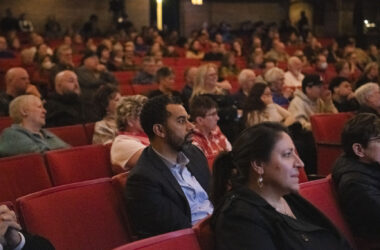I accompanied a woman to her psych evaluation this week. I’ve never been to a psych eval before.
The psychiatrist was amazingly kind. She shared that the evaluation is long, yet you have the option to answer any questions, or not — no pressure. She shared that some questions are probably redundant from other health care visits but sometimes databases don’t connect to each other, and sometimes it’s valuable to ask the same questions to see if the answers are different now. Sometimes that helps for knowing whether current meds are having the desired results, and sometimes redundant questions can help identify new med needs.
She shared that the questions are a lot, so it’s OK to say you’re done at any point, and the evaluation can continue on another day. And she shared that some questions might relate to life traumas, and please go general and shallow for now, not deep. Deep can happen in future meetings, where there is time to help you back out of the trauma conversations and memories. For the eval, it’s shallow time.
She asked many questions, in many directions. She made time for me to also share some observations. My person has trouble washing and brushing her hair. It’s not a physical disability thing — her arms and hands move fine. Yet she shares that it’s hard to explain, yet she can’t process what to do to wash her hair and to brush it.
My person experiences schizophrenia, and the doctor framed some questions connected to that:
Do you hear voices in your head? Yes. Almost all the time.
Do they tell you to do things? No.
What do they say? It’s hard to know, and hard to explain.
Do they scare you? No.
Sometimes people who experience schizophrenia have a hard time with white noise, and the shower and bathroom fans can be overwhelming to some people, especially if they also are hearing voices. Is that happening for you? No. I just can’t process what to do to wash and brush my hair.
And many more questions, in many directions. Yet at the end, I was able to ask a few questions. We’ve sheltered some women who experience schizophrenia, and some of them have been resistant about showering once a week, which is a requirement in our shelter.
We don’t have showers on site, yet many women shower at family or friends’ places, or at various homeless services providers that offer free showers. I knew that many women have been raped in showers, so showers can be a common trigger.
Yet I didn’t know that schizophrenia can make showers even harder. Yet apparently it can be overwhelming to some people to have voices and shower noise and a bathroom fan going all at once. Hearing that was sad and huge, as I imagined all that noise, and trying to function through it all.
Suddenly, my perception that some people in this situation are resisting showering shifted. “Resistance” cannot be accurate when it may really be about too much noise to deal with. If we don’t experience that, how can we judge, and how can we say it’s resistance?
The psychiatrist also shared that with some people, schizophrenia can also make it hard to remember things, and hard to communicate and have conversations. With meds and time, my person had shifted from being almost catatonic, to being able to ask questions, answer questions, make some requests, and share some thoughts, usually in short sentences. Yet she’s silent or very slow in answering some questions, and flowing conversations don’t happen (yet?).
I wondered how I’d feel if voices were always in my head, and I’m not able to have flowy conversations that may lead to friendships. I can’t say how anyone else might feel, yet it seems like I’d feel very lonely.
I asked the doctor what we might do when someone experiences schizophrenia and has a hard time showering? She shared that it’s common for people not to know why showering is hard for them. So we can share that some people hear voices, and for some people the sound of the water and the bathroom fan and the voices is too much. She shared that conveying possibilities can help people to understand why it’s hard for them — insight is treatment. (Her words.)
From there, if the person relates to the possibility that showers may be too much noise, we can share ideas — maybe you get wet, turn the water off as you wash yourself, and turn the water back on to rinse? Maybe you don’t turn the bathroom fan on? Maybe those things help?
More than anything though, validate that it can be hard. Apply the concept that people may not remember what you did together yet they always remember how you made them feel. Behave in ways that have people feeling that they are heard, seen, valued, and that their opinions and fears are valid. Do that with anyone we interact with — all humankind, not just our clients.
And now you know why I fell in love with a psychiatrist today.
—
After the long evaluation, we went to a coffee shop for coffee and scones. My person loves sweets. She answered a lot of questions during the evaluation, and I’d say she was talked out, yet even without a long evaluation, she’s not much for flowy conversation. So we sat across from each other, together, yet silent.
I remembered times of people-watching, and wondering how some people can sit and share food and drinks, without any conversation? And I wondered what led them to have such a bad relationship to just sit with no connection happening?
Now, sitting with my person in silence, I noticed how naive and inaccurate my previous perspectives were. How can I know anyone else’s reasons for silence? How can I connect silence to unconnection, when silence can be and mean so many different things?
I can’t say how my person is feeling or what she is thinking, yet I imagine that the evaluation was a lot for her.
On my end, my head is full of the new things I learned, and full of awareness of how much I didn’t know, how much I still don’t know, and how my opinions and perceptions were so deeply inaccurate that I should sit much more often in “I don’t know.” And sitting in shared silence, knowing other people might be judging that, and not caring at all.
I don’t know if we’re connected in our silence, but I do know that I’m a little in awe of her, for her bravery in answering all those questions; for her ability to function through voices that are always there, for her trying again each day, through things I can only imagine.
The silence between us might or might not be a weird style of connection, or it might be nothing at all. But we both know that her coffee and my chai are soothing and healing, and we both know those scones are delectable. Maybe silence says more than it seems to on the surface.
STORY TIP OR IDEA? Send an email to Salem Reporter’s news team: [email protected].
SUPPORT OUR WORK – We depend on subscribers for resources to report on Salem with care and depth, fairness and accuracy. Subscribe today to get our daily newsletters and more. Click I want to subscribe!
Lynelle Wilcox has served people experiencing homelessness in Salem for six years - initially volunteering at warming centers and homeless events. As people shared their stories through the years, she saw how much a smile and hello can create commonality, connection, and sometimes hope. And hope can change everything. She writes about some of the things she’s learned along the way, and shares some of the stories. She adores her kids, and loves vivid colors, cats, happy clothes, music, cooking, skies, dogs, and daisies









